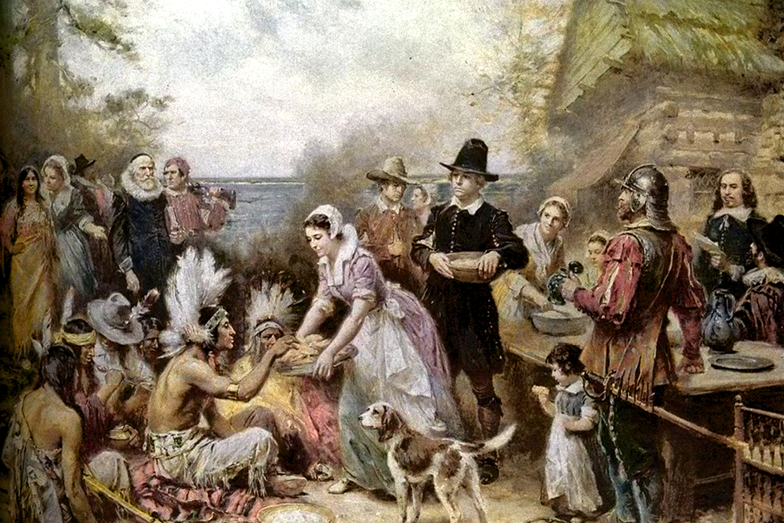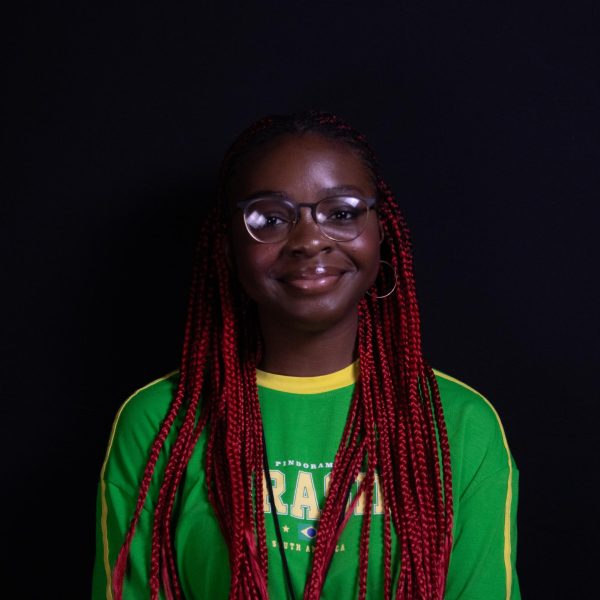To Celebrate or Not To Celebrate
Jean Leon Gerome Ferris – Wikimedia Commons
Nearly 90% of Americans celebrate Thanksgiving, making it the second most popular holiday in the United States. When most people think of Thanksgiving, they think of eating a bunch of food and spending quality time with loved ones. However, this is not the same thought for everyone, as the history of the holiday lingers in their minds. The celebration, which is mainly presented as unity between the pilgrims and Native Americans may have a darker past than many would like to admit.
For most people, their introduction to Thanksgiving is in elementary school. Where they learn about Squanto and the rest of the pilgrims. Then as they progress in their education, they learn about the holiday in more detail. However, what is taught is not optional. AP Euro Teacher, Rena Long says that teachers follow a curriculum that tells them what they need to cover.
“I’m not familiar with what the specific TEKS are for Thanksgiving, but the state tells us what to teach. We can go off a little, but we just have to be careful about what we teach. We need to show both sides of an issue if there’s an issue to be told,” explained Long.
The first Thanksgiving was celebrated in November 1621 at Plymouth to thank the Native American tribe, the Wampanoag, for helping guide the pilgrims through a successful harvest. Or so many people have been taught. However, the origin of Thanksgiving was in 1637, after the slaughtering of the Pequot tribe. Colonists celebrated the massacre, calling it “Thanksgiving.” Years later, Thanksgiving was used to remember what had occurred years prior instead of the actual event. Junior, Nadia Nester was never taught this in school until years later and believed Thanksgiving was a unifying day.
“They used to say that it was a feast that the pilgrims and Native Americans had and that it was peaceful and amazing and whatever in elementary school. But after learning more about it in school, I know now that this idea is false because even though the dinner happened, it wasn’t the first thanksgiving if that makes sense. I think kids in school should be taught about what actually happened during and after the Thanksgiving story, and not just the made-up version,” said Nester.
As people become more aware of the backstory behind Thanksgiving, some have called for the end of the holiday altogether. Corporations such as Vogue and the New York Times, have questioned the morality of celebrating the holiday via articles. In addition, on the change.org website, there are many petitions calling for the end of Thanksgiving as a federal holiday. Some people fall in the middle of the debate and can see both sides of the argument. Senior, Gabriel De La Cruz is one of those people.
“It shouldn’t be a day of celebrating the acquisition of land through torture and fear, but also be a day to honor Native Americans for just being them, and being humble despite our ancestors not being humble,” stated De La Cruz.
Opinions on Thanksgiving also vary depending on which side a person is coming from. For many Native Americans, it’s a day that reminds them of the attacks on their ancestors. For many Americans, it’s a day to celebrate togetherness among different groups of people. AP US History Teacher, Leigh Anne Smith thinks it’s important to acknowledge each perspective.
“So you have the perspective that it was the Pilgrims and Natives that helped the Wampanoag tribe get through their harsh winter. There is also a day years later where John Winthrop had a celebration for defeating the Pequot tribe. So a lot of people see it as a slap on the Natives because we’re celebrating that, but I like to look at the more 1861 realm of it where it was just, hey, we’re having all these different days of thanks, why don´t we make it a day where everyone celebrates at the same time,” stated Smith.
For those who are Native American, the history tends to cut a little bit deeper. To Native Americans, Thanksgiving is known as the National Day of Mourning. It is a day used to remember what their ancestors went through and honor their efforts to defend themselves. Sophomore, Gabriella Costilla, who has Native American family members through her Father’s side, explains they did not choose to partake in Thanksgiving celebrations.
“They do not see a point in celebrating Thanksgiving. To them it’s not offensive, but it has impacted them in a way that has hurt them which I don’t think a lot of people care about or realize, but if you are celebrating Thanksgiving they don’t pay mind to it instead they celebrate the National Day of Mourning in order to remember their history and family,” explained Costilla.
As the years have gone by, some say that Thanksgiving has become less about the pilgrims and Natives and more about a glorified meal. This leads to the question if people are actually celebrating the significance of the first Thanksgiving, or using it as a time to relax. Senior, Gabriel De La Cruz doesn’t believe that people are trying to celebrate the violence surrounding Thanksgiving.
“I don’t think people are like ‘Let’s sit down and eat a meal because the colonists treated the Native Americans badly.’ I think over time Thanksgiving has lost its meaning and now it’s just a celebrated day off to hang out with your family or friends and watch football on the couch while someone cooks and someone else sets up games and such,” explained De La Cruz.
Despite its history, Thanksgiving continues to remain a dominant holiday in America, and regardless of the opinions that surround the holiday, it is still something cherished by many Americans and looked down upon by Native Americans. However, it may necessary to see both sides of the latter.


